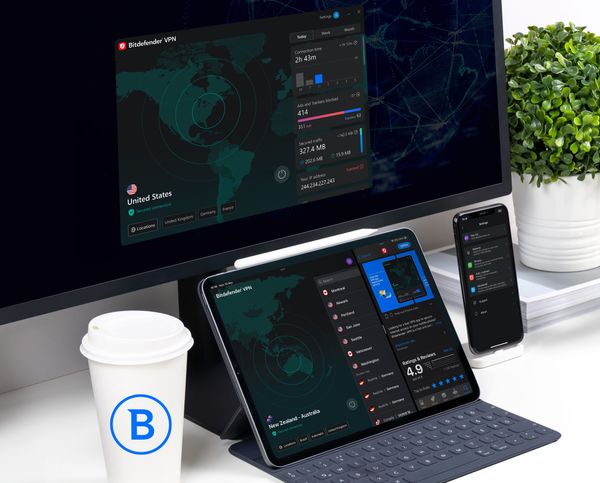Most Common VPN Scams You Need to Avoid

With data breaches, violations, tracking and data harvesting incidents happening on a daily basis, safeguarding your digital privacy has become crucial.
Using a VPN to protect your privacy has become as common as installing antivirus software to defend against e-threats.
The market is overflowing with VPN solutions, each promising to deliver greater anonymity than the previous one. However, an oversaturated market makes choosing a solid VPN difficult, especially for novices, and leaves some elbow room for opportunistic scammers to carry out their shady practices.
Much like other marketable products, VPNs are subject to a wide range of scams. Fortunately, most of the time, they can be easily avoided if you know where to look. The most frequently encountered VPN scams are:
- Free VPNs
- Fake VPNs
- VPN with fake reviews
- Fake zero-logging policies
- Data-harvesting VPNs
- Overpromising and underdelivering VPNs
- Lifetime VPNs
1. Free VPNs
While free VPNs aren’t inherently dangerous or scams, many harbor ulterior motives. Free VPNs usually carry some revenue-generating methods, such as attractive subscription plans, referral plans that reward you with extra usage points or annoying ads.
Some free VPNs also carry out data harvesting schemes, hence the $0 price tag. In other words, you don’t pay them with money; you just let them harvest enough data that the provider sells to maintain and operate the VPN servers.
If you can’t afford a premium VPN or feel like you don’t need one, you must look after a few things:
- Make sure that the service is a reputable one (many trustworthy VPNs offer free, demo, or trial versions of their service)
- Check the policy; well-established VPNs have clear, transparent policies
- Remember that there’s no such thing as a completely free VPN; either it’s limited, or it exploits you to recover its losses
2. Fake VPNs
As their name suggests, fake VPNs are rogue services that pose as legitimate ones to benefit their financially motivated operators. In some cases, the fake service was simply created by malicious actors to harvest users’ data.
While some VPN services are meticulously crafted to throw you off the trail, there are several signs that help you spot a fake VPN, including:
- The service is provided and owned by a recently established company with no history in VPN development
- The VPN’s privacy policy is poorly redacted and ambiguous
- There is no contact information
- Has fake contact information that tricks you into reaching out to scammers
- Doesn’t work as it should (leaks data, doesn’t hide your IP address)
- Assigns you the same IP address, no matter what device you’re using (fake IP address)
3. VPN with fake reviews
A VPN with fake reviews should be immediately apparent. You’ve never heard of it, yet millions of users have, and they all say the same thing: ‘It’s fantastic!’ and they ‘can’t believe the price-quality ratio’.
Most of the time, these services create their own website and shamelessly promote their product by adding fake reviews and testimonials. If you’ve been on the Internet for longer than just one day, you probably know what a legitimate review/comment/testimonial section should look like.
Real users often hide behind nicknames and don’t leave perfectly written bits of text; most don’t even capitalize words at the beginning of sentences. Yet somehow, fake testimonials always come from people displaying full names, with perfect grammar, and no criticism toward the product.
4. Fake zero-logging policies
Flashing a zero-logging policy sticker on your website is a widespread practice among VPN providers. While it’s not illegal or wrong to do that if you’re not logging customer data, many VPN providers make this promise even though their privacy policy says otherwise. Behind these bold claims, their privacy policy reveals that they do collect users’ data such as IP addresses, timestamps, and a list of services accessed while connected to the VPN for the sole purpose of analyzing and improving their services.
Although it may look benign, providers based in 5, 9, or 14-Eyes Alliance countries are subject to regulations that force them to hand out the data if requested by authorities. Since this data can be used to identify users and track their location, it could render the VPN useless.
5. Data-harvesting VPNs
A VPN requiring too much personal data during registration may feel counter-intuitive. Some services require a valid email address for activation and use third-party platforms for payment processing.
However, other services might require you to spell out your full name, address, Social Security number, and credit card information, permanently tying you to your online identity.
If you’re concerned about giving out private details, you should steer clear of services that require too many bits of personally identifiable information (PII) from you. The degree of PII you want to hand out should be one you’re comfortable with, especially if the service you’re registering for is not well-established or reputable.
6. Overpromising, underdelivering VPNs
Phony VPNs often engage in unfair practices such as promising eye-watering speeds, unmatched encryption, and a plethora of additional features to enhance your experience. None of them delivers though. Speed can be affected by several factors, such as distance to the server or hardware, encryption is not debatable (it’s either 256-bit or bust), and the extra features are useless most of the time.
A quick way to determine if your VPN is worth it is to perform a speed test on its “Automatic” server, check for leaks, and see if its basic privacy options (kill switch, split tunneling, ad blocker) work.
7. Lifetime VPNs
Last but not least, you should err on the side of caution when it comes to lifetime VPNs. The costs associated with developing and maintaining a VPN network are far from cheap. These services are either short-lived or engage in shady activities to cover their losses, such as data mining or adding extra features and locking you out of them (unless you pay extra, that is).
Furthermore, lifetime VPNs frequently lack customer support or offer a limited version. It is no surprise that subscription-paying customers are often prioritized, and free or lifetime VPN users have to wait longer to get assistance.
Subscription-based services such as Bitdefender VPN are more down-to-earth than lifetime VPN alternatives and ensure you get the most out of what you’re paying.
VPN scams are not impossible to avoid
To wrap it up, while scams and fake services may ride the VPN market, they’re easy to identify and avoid most of the time. Doing your research properly before committing to a VPN provider for the long run can increase your chances of landing a legitimate service that grants you anonymity, security, and peace of mind.
tags
Author

Vlad's love for technology and writing created rich soil for his interest in cybersecurity to sprout into a full-on passion. Before becoming a Security Analyst, he covered tech and security topics.
View all postsRight now Top posts
How to Protect Your WhatsApp from Hackers and Scammers – 8 Key Settings and Best Practices
April 03, 2025
Outpacing Cyberthreats: Bitdefender Together with Scuderia Ferrari HP in 2025
March 12, 2025
Streamjacking Scams On YouTube Leverage CS2 Pro Player Championships to Defraud Gamers
February 20, 2025
How to Identify and Protect Yourself from Gaming Laptop Scams
February 11, 2025
FOLLOW US ON SOCIAL MEDIA
You might also like
Bookmarks








